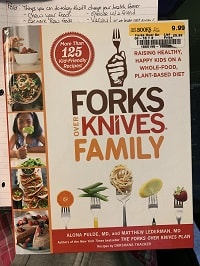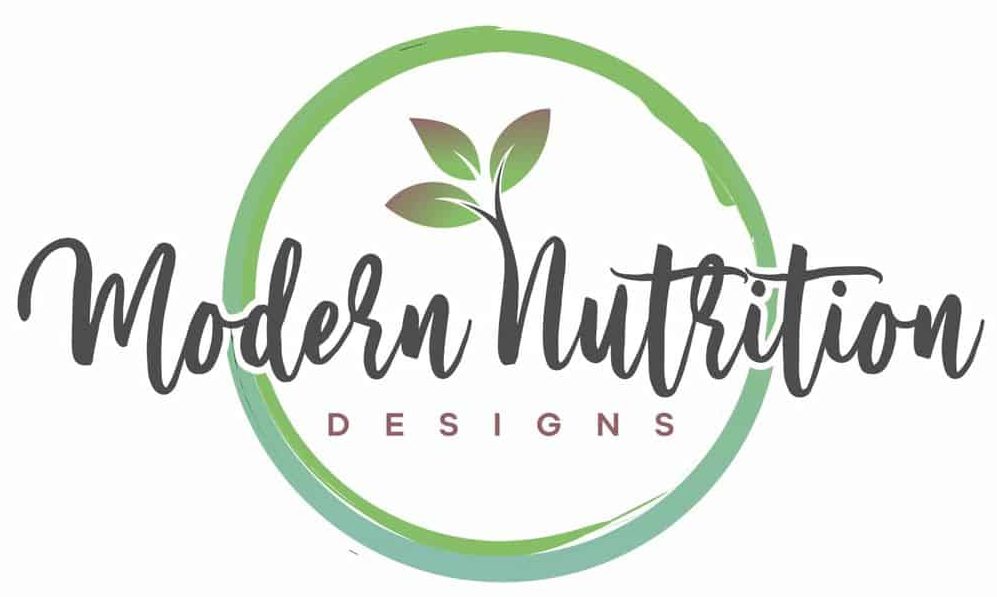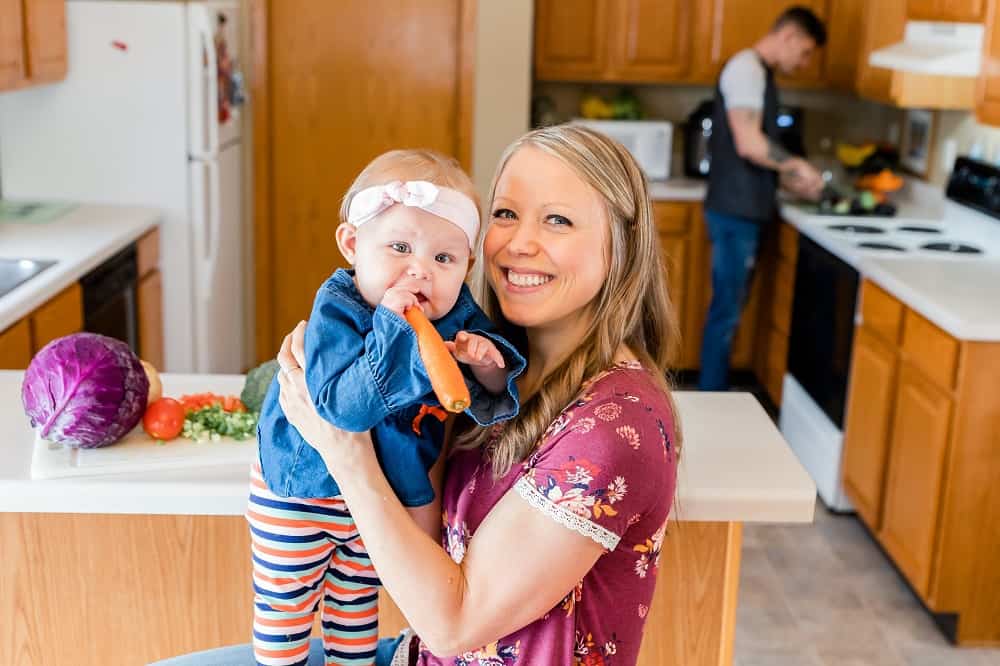As a plant-based Mama, I naturally want to incorporate the healthy meals I make for myself into my child’s diet as smoothly and as safe as possible. I did some research on plant-based eating throughout the life cycle, beginning with infancy, to ensure my daughter would obtain all her nutrients from the plant foods in my diet.
To safely raise a plant-based, vegan baby learn the types of foods you will need to include in his/her diet to ensure adequate nutrition requirements are met. Then begin substituting healthy vegan alternatives in place of animal foods. Eventually, you will make your own style of plant-based cuisine where you will no longer rely on vegan analogs.
It is not only safe to raise plant-based babies, it is also encouraged! More and more pediatricians are beginning to recognize the benefits of weaning your baby off breast milk with a whole plant food diet.
This article will cover the following topics:
- Plant-based for babies 0-6 months of age
- Plant-based for 6-12 months of age
- Things to consider when deciding when and what to feed your baby
- Plant-based beyond 6-12 months of age
- Plant-based for toddlers
- Supplements to consider recommended for vegan children
- Vitamin B12
- Vitamin D
- DHA
- Major benefits for your plant-based kiddo (from 6 months-on)
Plant-based for babies 0-6 months of age
Most adults develop their eating habits early on in their childhood. Let’s face it, most of us still default to the foods we grew up with; mac n’ cheese, pizza, burgers, cereal for breakfast, ice cream for dessert, etc. Giving kids the opportunity to learn how to nourish themselves with whole healthy plant foods will set them up for a lifetime of success.
During the first 6 months of life:
Children are ideally nourished solely by their mother’s milk during the first 6 months. If there is an underlying barrier to breastfeeding such as an inability to produce sufficient amounts, or if the baby is having trouble latching, there are commercial soy-based alternatives.
You can find organic vegan soy-based baby formulas in several locations such as your local health food store, Target, Aldis, or online. There is a large selection with prices comparable to standard baby formula containing cow’s milk. There are also soy-free options for those who are wary of soy ingredients.
Soy formula is different from soy milk, nut milks, and cow milks. According to the Physician’s Committee of Responsible Medicine, there is no point during a child’s lifetime, (nor an adult’s lifetime) in which they will require cow’s milk for proper nutrition.
The American Academy of Pediatrics (AAP) recommends that mothers continue to breastfeed throughout the first 12 months of their baby’s life. It is also considered beneficial to continue breastfeeding beyond 12 months of age, for as long as the child desires. For more on plant-based breastfeeding click here to visit my article titled Breastfeeding on a Plant-based or Vegan Diet: Insider Tips.
Plant-based for 6-12 months of age
Introducing baby’s first foods is an exciting time for any parent. For my family, we found the baby-led weaning approach to be most beneficial. We started our whole foods plant-based baby on sweet potatoes, avocado, broccoli, bananas, and carrots to name a few staples. For more detailed information on vegan baby-led weaning please click here (coming soon).

There are a few things to consider when deciding when and what to feed your baby:
- A baby’s digestive tract has developed to a sufficient enough degree where they can begin ingesting other food substances beyond breast milk by 6 months of age. According to Dr. Joel Fuhrman, in his book Disease Proof Your Child, he explains how the cells that make up a baby’s small intestinal lining remain loosely linked together in order to allow the mother’s antibody’s from breast milk to pass into the baby’s bloodstream.
- After about two years of age, these cells form together creating a tight junction that no longer allows certain substances in food to pass through the intestinal lining. This also explains why allergies are thought to develop within the earliest months of development, given the circumstance where the child is fed solid food items prior to achieving this tight junction between cells.
- According to Dr. Fuhrman, the optimal duration to breastfeed is actually two years because this is the typical amount of time required for the baby to have generated a significant amount of its own antibodies.
- Some parents choose to incorporate one food at a time for about 3 to 5 consecutive days before introducing another food item to keep track of potential culprits of food allergies and sensitivities. Feeding solid foods to the child in the morning, as opposed to later in the evening, will allow enough time to carefully observe your child for any noticeable reactions.

Plant-based beyond 6-12 months of age
It is considered safe to begin introducing solid whole plant foods beyond 6 months. Some parents choose to begin with a minimally processed iron-enriched baby cereal topped with breast milk. Others may choose to puree foods such as sweet potatoes to include in the baby’s bottle with breast milk.
If you are more interested in trying a baby-led weaning approach, you can start with whole chunks or slices of plant foods, such as broccoli, potatoes, carrots, and banana. Baby is now ready to have whole veggies, fruits, squashes, potatoes, and legumes.
Some sources state that whole grains are safe to incorporate into your baby’s diet at this age, but I was skeptical. I decided to wait until about 8 months before introducing ANY processed items, including whole grains. This decision was based on my family history of gastro and autoimmune disease.
After 8 months I began including more oatmeal, rice, blueberries, grapes, and beans into Ionna’s diet. Sources state that smaller foods are safe for baby when they develop the pincer grasp, or when they start pinching foods between their thumb and index finger to bring it to their mouth.
The majority of your baby’s nutrition should still be coming from breast milk up until around 12 months of age. There is this wonderfully adequate saying that goes, “foods before one are just for fun”.
Don’t stress out about whether your child is actually consuming sufficient amounts of solid food prior to 12 months. Breast milk still contains all the nutrients your baby requires at this stage of development.
Plant-based for toddlers
According to Forks Over Knives Family, after your child’s first birthday your child can consume pretty much anything you do. As long as you focus on providing plenty of whole fruits, veggies, whole grains, tubers, and legumes you never need to worry about whether your child is getting adequate nutrition from their diet.

There is no need to focus on conventional strategies for breakfast, lunch, and dinner. It is perfectly okay to serve spaghetti for breakfast, or oatmeal for lunch.
There is also no need to concern yourself with the USDA’s recommendations for consuming adequate nutrients from each of the government recognized food groups: dairy, “protein”, vegetables, fruits, and grains. As long as you provide plenty of plant-based options from the following categories within any given week, your child will grow up healthy:
- fruits
- veggies
- whole grains
- tubers
- legumes
Supplements recommended for vegan children
Vitamin B12:
According to the Forks Over Knives folks, the vast majority of vitamins and minerals needed to carry out daily metabolic processes that take place in the body, (children and adults alike) should come from whole plant based foods. The only exception to this statement is that of vitamin B12.
Dr. Michael Klaper explained the modern need for B12 supplementation best by stating that prior to sewage management systems, vitamin B12 was easy to come by in plant foods. These sanitation systems are in place, however, to keep people from obtaining nasty infections from microorganisms.
Our modern hygienic practices have removed such infectious diseases as hepatitis A, dysentery, diarrhea, and cholera. I agree it is an easy decision when choosing between cholera or the need for vitamin B12 supplementation.
B12 is important for nervous system maintenance and red blood cell formation. It’s actually produced by bacteria found in the soil.
A reasonable time to introduce a vitamin B12 supplement to your child is when they begin consuming more solid foods than breastmilk. Dr. Alan Goldhammer of True North Health Center in Santa Rosa California recommends upwards of 1,000 micrograms for adults. You should speak with your pediatrician about specific dosages for your baby.
In Forks Over Knives Family, the authors recommend crushing a lozenge into a powder then sprinkling this on your child’s food or offering it to her on your finger. They further recommend the Jarrow brand because it is tasty enough that kids tend to readily accept it.
Vitamin D:
Most pediatricians currently recommend vitamin D3 supplementation to all babies and nursing mothers. In our modern environment, it is highly unlikely that we are spending adequate amounts of time in the sunshine to absorb enough vitamin D. I began taking a 5,000 IU (125mcg) vegan D3 daily when I initially began breastfeeding due to my research on the topic and my daughter’s pediatrician’s insistence.
Pediatricians may also insist on giving a vitamin D3 supplement to your baby right away at the start of nursing. Personally, I was not comfortable with this. I don’t feel Vitamin D3 supplementation has been utilized in the human body long enough to understand its full impact on the developing brain and body.
As soon as my daughter transitions to a diet that is greater in solid foods than breastmilk, however, I plan to incorporate a liquid D3 dose into her diet regularly. Even in the summertime studies have consistently shown that we simply do not get adequate amounts of exposure from the sun to properly maintain and convert this hormone.
DHA:
Vegans get plenty of omega-3 and omega-6 through foods such as seeds, nuts, and avocado. The conversion of these fatty acids into DHA and EPA in the body is not always sufficient, however. Sometimes it is helpful to take these fatty acids in a readily metabolized form, such as with DHA/EPA supplementation.
DHA is commonly supplemented in the form of fish oil capsules. This is completely unnecessary since fish obtain their DHA originally from algae. You can find many varieties of the algae-derived form of DHA online or in health food stores.
Dr. Fuhrman recommends supplementing with 250mg of algae-derived DHA once daily. Ask your family pediatrician for specifics on DHA dosage for your baby.
When choosing a supplement of any kind it is important to check all the ingredients on the label before making a decision, as many of them contain gelatin. Gelatin is derived from the skin, bones, and connective tissues of animals. Most come from domesticated animals such as cows and pigs.
A word on iron requirements
I have received more comments and concerns regarding my daughter’s iron intake than any other nutrient due to our plant-based-vegan lifestyle.
The video below explains why supplementing with this vital nutrient is unnecessary and even dangerous in most cases.
Major benefits for your plant-based kiddo (from 6 months-on)
- Kids who grow up plant-based tend to have a steady healthy weight which is usually well maintained into their adulthood.
- These children also have lower rates of diabetes, heart disease, high blood pressure, and obesity according to the Physicians Committee for Responsible Medicine.
- When compared to their animal consuming peers, vegan kids have lower rates of allergies, gastro-intestinal issues, and acne.
- Plant-based foods are naturally low in cholesterol and saturated fat which play a large role in typical Western diseases.
Again, it is so crucial to do your research. Don’t take my word for it. You can cross-reference my information with that found in peer-reviewed journals and other reputable websites.
I hope this post was helpful in assisting you on your plant-based, vegan, or otherwise healthful journey!

